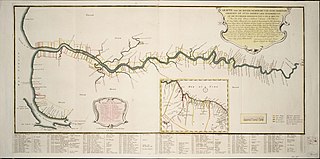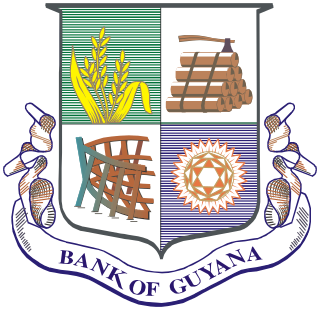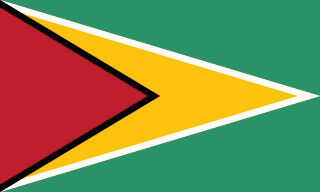
As part of the foreign relations of Suriname, the country is a participant in numerous international organizations.
The history of Guyana begins about 35,000 years ago with the arrival of humans coming from Eurasia. These migrants became the Carib and Arawak tribes, who met Alonso de Ojeda's first expedition from Spain in 1499 at the Essequibo River. In the ensuing colonial era, Guyana's government was defined by the successive policies of the French, Dutch, and British settlers. During the colonial period, Guyana's economy was focused on plantation agriculture, which initially depended on slave labor. Guyana saw major slave rebellions in 1763 and 1823. Following the Slavery Abolition Act of 1833, 800,000 enslaved Africans in the Caribbean and South Africa were freed, resulting in plantations contracting indentured workers, mainly from India. Eventually, these Indians joined forces with Afro-Guyanese to demand equal rights in government and society. After the Second World War, the British Empire pursued policy decolonization of its overseas territories, with independence granted to British Guiana on May 26, 1966. Following independence, Forbes Burnham rose to power, quickly becoming an authoritarian leader, pledging to bring socialism to Guyana. His power began to weaken following international attention brought to Guyana in wake of the Jonestown mass murder suicide in 1978.

The economy of Guyana is one of the fastest growing economies in the world with a gross domestic product (GDP) growth of 19.9% in 2021. In 2024, Guyana had a per capita gross domestic product of Int$80,137 and an average GDP growth of 4.2% over the previous decade. Guyana's economy was transformed in 2015 with the discovery of an offshore oil field in the country's waters about 190 km from Georgetown, making the first commercial-grade crude oil draw in December 2019, sending it abroad for refining.

British Guiana was a British colony, part of the mainland British West Indies. It was located on the northern coast of South America. Since 1966 it has been known as the independent nation of Guyana.

The Bank of Nova Scotia, operating as Scotiabank, is a Canadian multinational banking and financial services company headquartered in Toronto, Ontario. One of Canada's Big Five banks, it is the third-largest Canadian bank by deposits and market capitalization. In 2023, the company’s seat in Forbes Global 2000 was 88. It serves more than 25 million customers around the world and offers a range of products and services including personal and commercial banking, wealth management, corporate and investment banking. With more than 89,000 employees and assets of CA$1,399 billion as of April 30, 2024, Scotiabank trades on the Toronto and New York exchanges. The Scotiabank swift code is NOSCCATT and the institution number is 002.

Demerara is a historical region in the Guianas, on the north coast of South America, now part of the country of Guyana. It was a colony of the Dutch West India Company between 1745 and 1792 and a colony of the Dutch state from 1792 until 1815. It was merged with Essequibo in 1812 by the British who took control. It formally became a British colony in 1815 until Demerara-Essequibo was merged with Berbice to form the colony of British Guiana in 1831. In 1838, it became a county of British Guiana until 1958. In 1966, British Guiana gained independence as Guyana and in 1970 it became a republic as the Co-operative Republic of Guyana. It was located around the lower course of the Demerara River, and its main settlement was Georgetown.

Linden Forbes Sampson Burnham was a Guyanese politician and the leader of the Co-operative Republic of Guyana from 1964 until his death in 1985. He served as Premier of British Guiana from 1964 to 1966, Prime Minister of Guyana from 1964 to 1980 and then as the first executive president of Guyana from 1980 to 1985. He is often regarded as a strongman who embraced his own version of socialism.

The Bank of Guyana (BoG) is the central bank of Guyana. It was established in 1965 in advance of the country's independence in 1966. Dr. Gobind Ganga has been the governor of BoG since December 2014.
State House located in Georgetown, is the official residence of the president of Guyana. It was previously the official residence of the governor of British Guiana before the colony gained independence and became Guyana.
The Arawak village of Wakapau (or Wakapoa) is located in the Pomeroon-Supenaam Region of Guyana, on the Wakapau River, a tributary on the west bank of the Pomeroon River, 3 kilometres (1.9 mi) from its mouth. The name originates from the Lokono word ‘Wakokwãn’, which means pigeon. The village is composed of twenty inhabited islands. Some of the islands only contain a single family.
Enmore is a village in the Demerara-Mahaica region along the coastal belt of Guyana. It is about two square miles (5.1 km2) in size and has a multi-ethnic population of 1,002 as of 2012,

The Guyana–Venezuela territorial dispute is an ongoing territorial dispute between Guyana and Venezuela over the Essequibo region, also known as Esequibo or Guayana Esequiba in Spanish, a 159,500 km2 (61,600 sq mi) area west of the Essequibo River. The territory, excluding the Venezuelan-controlled Ankoko Island, is controlled by Guyana as part of six of its regions, based on the 1899 Paris Arbitral Award. It is also claimed by Venezuela as the Guayana Esequiba State. The boundary dispute was inherited from the colonial powers and has persisted following the independence of Venezuela and Guyana.

Republic Bank Limited is a Caribbean financial institution headquartered in Trinidad and Tobago. It has operations in Anguilla, Barbados, the British Virgin Islands, the Cayman Islands, Dominica, Ghana, Grenada, Guyana, St. Kitts and Nevis, Saint Lucia, St. Maarten, St. Vincent and the Grenadines, Suriname and Trinidad and Tobago. It was formerly a division of Barclays Bank in Trinidad and Tobago.

Guyana officially the Co-operative Republic of Guyana, is a country on the northern coast of South America, part of the historic mainland British West Indies. Georgetown is the capital of Guyana and is also the country's largest city. Guyana is bordered by the Atlantic Ocean to the north, Brazil to the south and southwest, Venezuela to the west, and Suriname to the east. With a land area of 214,969 km2 (83,000 sq mi), Guyana is the third-smallest sovereign state by area in mainland South America after Uruguay and Suriname, and is the second-least populous sovereign state in South America after Suriname; it is also one of the least densely populated countries on Earth. The official language of the country is English, although a large part of the population is bilingual in English and the indigenous languages. It has a wide variety of natural habitats and very high biodiversity. The country also hosts a part of the Amazon rainforest, the largest tropical rainforest in the world.
Petroleum industry in Guyana is rapidly evolving. Guyana has emerged as one of the newest petroleum producing regions in the world, achieving its first commercial grade crude oil draw in December 2019. Crude oil is sent abroad for refining.

Agriculture in Guyana is dominated by sugar and rice production. Although once the chief industry, it has been overshadowed by mining.
Mining in Guyana is a significant contributor to the economy owing to sizable reserves of bauxite, gold, and diamonds. Much of these resources are found in Guyana's Hilly Sand and Clay belt, a region that makes up 20% of the country.
Banking in Guyana follows the country's tumultuous economics history, from formal introduction under British rule, the socialist-oriented nationalization of banks at independence, to IMF sponsored open-market initiatives. The banking industry faces increased pressure to meet global standards domestically, as well as attract international investors, and serve the large number of diaspora that remain economically tied to the country.
Guyanese nationality law is regulated by the 1980 Constitution of Guyana, as amended; the Citizenship Act of 1967, and its revisions; and various British Nationality laws. These laws determine who is, or is eligible to be, a national of Guyana. Guyanese nationality is typically obtained either on the principle of jus soli, i.e. by birth in Guyana; or under the rules of jus sanguinis, i.e. by birth abroad to parents with Guyanese nationality. It can also be granted to persons with an affiliation to the country, or to a permanent resident who has lived in the country for a given period of time through naturalisation. There is not currently a program in Guyana for persons to acquire nationality through investment in the country. Nationality establishes one's international identity as a member of a sovereign nation. Though it is not synonymous with citizenship, for rights granted under domestic law for domestic purposes, the United Kingdom, and thus the Commonwealth, have traditionally used the words interchangeably.











